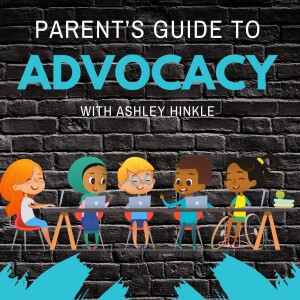Parents Guide to Advocacy: Navigating the Special Education System with Confidence
Does attending IEP meetings full of educational jargon and legalese leave you confused, overwhelmed, and exhausted? IEP meetings and the special education system can be imbalanced leaving you on your own against a table of educators. That’s ok, many parents are unfamiliar with the educational services available for their child and are unsure of what to ask for in IEP meetings. Maybe you’re looking for the special education process to be broken down in a relatable way by someone who ”gets” the emotional experience of trying to advocate for their child. We will make the IEP process seem more manageable leaving you more equipped and prepared. Finding out your child is different with an educational diagnosis is hard. Let’s walk through the initial tornado of emotions and questions. We will learn to see beyond the diagnosis and focus on your child’s unique abilities and superpowers. Our goal is to equip, empower, and support parents to become fierce advocates for their child’s unique educational needs. You will become resourced and resilient while learning how to embrace a neurodivergent affirming mindset. When neurodivergence is embraced, acceptance and encouragement allow children to thrive in their own way. When children are loved and properly supported they feel a sense of belonging. You may feel a shift from discouraged to empowered as you keep the long term vision for your child in the forefront and align your decisions with those values. You will uncover the secrets to navigating the special education system with Ashley Hinkle’s experience on both sides of the IEP table as both an educator and a mom to a son with Autism/ADHD. You may find yourself asking, ”How did I not know that?” ”Why did they never tell me that?” Ashley explains the special education system in a way that shifts it from feeling overwhelming to understandable.
Episodes

Wednesday Jul 17, 2024
Wednesday Jul 17, 2024
E10: One Strategy for Parents to Recharge and Learn at the Same Time!
In this episode of the Parents Guide to Advocacy, host Ashley Hinkle discusses the importance of taking time to recharge as a parent and highlights one effective strategy: attending conferences. Ashley shares her personal experiences attending the Apraxia Kids National Conference, the benefits of connecting with others who understand similar challenges, and the invaluable insights gained from these interactions. The episode emphasizes the impact of personal growth on parenting, the significance of community support, and practical tips for balancing the demands of parenting neurodivergent children with self-care and professional development.
00:00 Introduction00:50 Dealing with Burnout01:35 Personal Experience at the Apraxia Kids National Conference03:00 Connecting with Others Facing Similar Challenges06:53 Community Support is Crucial09:53 Final Thoughts and Encouragement10:35 Call to Action

Tuesday Jul 09, 2024
Tuesday Jul 09, 2024
In this episode, we dive into the Individualized Education Program (IEP) meeting pathway, breaking down the special education process into manageable stages to ensure parents and educators can better understand and navigate each step. The key stages discussed include the initial referral, evaluations and assessments, eligibility determination, IEP development, implementation, and periodic reviews.
Resources:
Article: 10 smart responses for when the school cuts or denies services
https://www.understood.org/en/articles/10-smart-responses-for-when-the-school-cuts-or-denies-services
Infographic: Maryland IEP Timelines
https://www.ppmd.org/wp-content/uploads/2021/01/IEP-Timeline-SPED-1.2021.pdf
00:00 Introduction to Advocacy
00:39 Understanding the Special Education Process
01:19 The Importance of Record Keeping
03:15 Early Identification and Support
05:29 Navigating the IEP Process
06:51 The Screening Meeting
08:09 The Eligibility Meeting
10:23 The IEP Draft Meeting
18:24 Annual Review and Reevaluation
21:55 Conclusion and Resources

Tuesday Jul 02, 2024
Tuesday Jul 02, 2024
E8: Characteristics of an Incredible Early Intervention Service Provider (Speech, Occupational, Physical Therapies)
In this episode, Ashley Hinkle discusses the essential characteristics that make an incredible early intervention service provider. From collaboration with parents to developing personal connections and focusing on customized therapy, the episode covers everything you need to know to select the right service provider for your child.
00:00 Introduction00:51 Difficulty Finding Great Providers01:33 Key Characteristics04:43 Engaging with Children07:27 Understanding Specific Needs09:54 Collaboration12:43 Conclusion and Call to Action

Thursday Jun 27, 2024

Tuesday Jun 04, 2024
Tuesday Jun 04, 2024
Embracing Neurodivergent Parenting: Discipline, Acceptance, and Support
This script emphasizes understanding and accepting behaviors as manifestations of a child's disability. It encourages parents to rewire their perspectives, adopt neurodivergent affirming practices, and provide unwavering support. The script highlights the necessity of showing self-compassion and loving the child as they are. The show provides more than 9 tips for disciplining a child with autism through a neurodivergent affirming perspective. The strategies range from self-regulation and changing the environment to allowing the child to face reasonable natural consequences.
Additionally, it references an article from Very Well Family that offers specific discipline strategies.
https://www.verywellfamily.com/discipline-strategies-for-children-with-autism-4005045
00:00 Introduction to Neurodivergent Parenting15:43 Understanding Behaviors and Acceptance15:57 Encouragement for Parents16:23 Final Thoughts and Resources

Tuesday May 28, 2024
Tuesday May 28, 2024
The Parents Guide to Advocacy: Empowering Resilient Families
In this episode of 'The Parents Guide to Advocacy,' host Ashley Hinkle shares her mission to equip parents with the tools needed to advocate for their children's unique educational needs. Reflecting on personal experiences, Ashley discusses the challenges of raising neurodivergent children and managing household chaos. She emphasizes self-reflection, personal growth, and equipping oneself with the necessary skills to support children effectively. Ashley also provides practical tips for finding stability, such as seeking therapy, building new friendships, and defining core values. Additionally, she underscores the importance of self-regulation, conflict avoidance, and allowing children to learn from their experiences. She urges parents to be resilient, adaptive, and to zoom out to see the bigger picture in chaotic situations. Finally, Ashley invites listeners to leave reviews, visit her website SparkEducationAdvocacy.org, and explore parent coaching and IEP representation services to become better advocates for their children.
00:00 Welcome to Your Advocacy Journey: Empowering Parents00:40 The Domino Effect: Navigating Family Chaos03:27 Self-Reflection: The Key to Changing Family Dynamics04:05 Empowering Choices: Letting Go to Grow08:45 Practical Tips for Stability and Self-Care11:17 Avoiding the Cycle of Chaos: Strategies for Peace13:07 Choosing Resilience: Overcoming Challenges with Strength14:48 Closing Thoughts and Resources for Advocacy

Tuesday May 21, 2024
Tuesday May 21, 2024
Empowering Parents: Advocacy for Neurodivergent Children
Ashley Hinkle hosts a comprehensive guide for parents on advocacy for neurodivergent children, focusing on equipping and empowering them to advocate for their children's unique educational needs. Ashley discusses the challenges and successes of raising neurodivergent children, specifically addressing concerns around bullying and how it can impact children with conditions like autism and ADHD. The script outlines practical strategies for parents to support their children, including teaching them about different forms of bullying, how to handle encounters assertively, and the importance of building a supportive community. Ashley emphasizes the need for parents to manage their anxieties to better advocate for their children, sharing personal experiences and suggesting ways to become resilient advocates. The guide also includes tips on finding therapeutic support, creating a neurodivergent-affirming environment, and preparing children to stand up against bullying confidently. Resources and coaching opportunities for navigating IEP meetings and the special education system are offered to help parents become effective advocates.
00:00 Welcome to the Parents Guide to Advocacy00:50 Navigating Bullying Concerns for Neurodivergent Children01:37 Personal Reflections on Bullying and Advocacy05:13 Strategies to Empower Children Against Bullying09:58 Building a Supportive Community and Conclusion
Resources:
Federal anti-bullying laws
https://www.stopbullying.gov/resources/laws/federal
Common components of state anti-bullying laws
https://www.stopbullying.gov/resources/laws/key-components
How disability-related Harassment impacts a Child’s Right to education section 504 and Title II
https://www2.ed.gov/about/offices/list/ocr/letters/colleague-bullying-201410.pdf
Article: The difference between Teasing and Bullying
https://www.understood.org/en/articles/difference-between-teasing-and-bullying
Article: How to Defend Kids from Bullies
https://www.understood.org/en/articles/how-to-defend-kids-from-bullies
Article: Bullying Laws: Your Child’s Rights at School
https://www.understood.org/en/articles/bullying-laws

Tuesday May 14, 2024
Tuesday May 14, 2024
Resilience starts with a strong foundation, and a primary caregiver who is safe, stable, consistent, and loving.
Resilience is not just surviving, it's thriving in life after the negative event; it’s more than bouncing back or getting back up.
Resilience results in:
-Increased motivation
-Positive outlook
-More focus on problem-solving
-Flexible thinking
Dr. Kenneth Ginsburg developed the 7 C’s of resilience to help families effectively raise resilient kids
-Competence
-Confidence
-Connection
-Character
-Contribution
-Coping
-Control
Actions that can be taken to develop resilience as a family with your kids:
-Prioritize shared experiences and quality time with your kids
-Non-judgemental bonding time
-Help children identify and share their feelings
-Encourage children to ask questions
-Validate their feelings and affirm that it is a difficult situation or decision
-Help Children with problem-solving skills
-Demonstrate healthy thinking patterns
-Model finding a sense of meaning and being hopeful
-Show that you have healthy coping skills
-Create SMART goals that encourage a sense of control, personal responsibility, and bravery
-Establish that failure is a normal part of life and embrace failure in your family culture
Resources:
The Secret to Raising a Resilient Kid
https://www.nytimes.com/2021/09/01/parenting/raising-resilient-kids.html
Growth Mindset Activities for Kids
https://www.nytimes.com/2021/09/01/parenting/raising-resilient-kids.html
Resilience Guide for Parents and Teachers
https://www.apa.org/topics/resilience/guide-parents-teachers
Resilience: 5 Ways to Help Children and Teens Learn It
https://www.health.harvard.edu/blog/resilience-5-ways-to-help-children-and-teens-learn-it-202202242694
5 Ways to Build Resilience in Students
https://www.edutopia.org/article/5-ways-build-resilience-students/
Maximizing Children's Resilience
https://www.apa.org/monitor/2017/09/cover-resilience
Coping with Anticipatory Anxiety:
https://www.verywellmind.com/anticipatory-anxiety-2671554
7 C's of Resilience:
https://www.pathfinder.health/post/helping-your-child-develop-resilience-using-the-7cs-model#:~:text=The%207%20C's%20of%20resilience%20in%20children&text=practice%20these%20concepts.-,Dr.,develop%20each%20component%20of%20resilience.
Maslow's Hierarchy of Needs:
https://www.verywellmind.com/what-is-maslows-hierarchy-of-needs-4136760

Tuesday May 14, 2024
Tuesday May 14, 2024
So, here is the most helpful and humbling thing I keep coming back to in different seasons of life: challenges reveal the areas that I need to grow in myself.
It’s humbling because we have to look at ourselves as a contributor to our struggle. And, it’s helpful because when we acknowledge what we bring to the table, then we can address the underlying issues, find creative solutions, and realize that we do have a sense of control. We can improve our situation. We can grow and become the parents we want to be for our kids. We can start to take the weights off the barbell one by one.
We can’t minimize the effects stress and anxiety have on us. Parenting is like a marathon and parenting kids who are neurodivergent is like running a tough mudder. There are obstacles everywhere and they vary in difficulty throughout. Just when I think I’ve cleared the most difficult by moving a 500-pound boulder out of the way, I fall face-first into a pit of mud. Suddenly, challenges appear that I didn’t foresee and adaptions have to be made just as quickly.
I’m sure many of you can relate. While I want to affirm the challenging experiences we have all had, there is hope in the struggle. It becomes the perfect time to humble ourselves, look inward at what the challenges reveal about ourselves, and get support to truly change our circumstances.
My goal in sharing these ideas is that you will feel empowered to self-reflect and be more introspective. Let’s all humble ourselves by finding out more about our internal challenges and reflecting on how our behaviors impact ourselves and others. The answers may help change our perspective and how we parent our kids. There’s also a little bit of freedom in doing nothing from time to time.

Tuesday May 14, 2024
Tuesday May 14, 2024
Before having my children, I was an elementary teacher and reading specialist. I have a Bachelor’s degree in Elementary Education and a Master’s in Reading Education. For years, I participated in IEP meetings as a general education teacher. I advocated for my students to receive intervention services and created my own accommodations and modifications to suit their needs. But, I left too many meetings frustrated with the special education team for not meeting service hours or providing appropriate support for a child’s needs. Even when pushing back and insisting that service providers not miss my student’s therapy sessions, there were still days when no one showed up. I kept records and one student didn’t have a single ESL (English as a Second Language) session in over a quarter when it should have been twice a week.
I became frustrated and disillusioned at the lack of accountability in the special education system. While I understand over extended caseloads, there is a systemic problem of cutting corners and not abiding by a child’s rights in IDEA (the Individuals with Disabilities Education Act). However, I learned one very important thing at the IEP table, if you want your student to get what they need, subtly tip off the parent. Why? Because the parent actually has the most power at the table! Yes, that’s right, you have the most power at that table. When you know the special education system, relevant laws, and your and your child’s rights in the IEP process, you hold all the cards.
The truth is the special education is confusing, overwhelming, and imperfect. We need a parent’s guide to navigate the law, jargon, services, and enforcement of our child’s rights. Most schools and teachers are doing their best with what they have. But, we as parents, have to become actively involved, knowledgeable advocates to ensure our children have access to a free and appropriate public education. We can’t depend on the schools to prioritize the specific needs of our children under the conditions that are present. We have to hold the special education teams at our children’s schools accountable and that starts at the IEP table.
My goal is to equip, empower, and support you to become a fierce advocate for your child’s particular educational needs. In this podcast, we will prepare ourselves to advocate by increasing our knowledge of the special education process through relevant educational resources. We will also discuss collaborative communication and how to present ourselves to be taken seriously in IEP meetings.
You will feel the shift from discouraged to empowered as we intentionally change our mindsets and adopt a neurodivergent affirming perspective. We are going to train ourselves in the executive functioning skills we expect to see in our children. Over time, we will notice that we are more reflective, intentional, and flexible parents. There is freedom in embracing the ability to adjust and adapt without getting fixated on one way of thinking. After all, we don’t have to do things the way they’ve always been done. We can change our routines, structures, and way of living to better suit our child’s or our family’s needs. I’ve found that being open to change has been the antidote to feeling stuck or trapped in a complicated situation.

Ashley Hinkle M.Ed
Special Education Advocate
Navigating the special education system and parenting neurodivergent kids is hard! There's so much to learn and so little time. At the Parent's Guide to Advocacy, we distill the latest research and neurodivergent affirming resources to equip and empower you to be your child's best advocate. You are the expert on your child and how their specific brain wiring impacts them uniquely. We will also walk you through the IEP process and how to assert yourself as a confident, capable, advocate at the IEP table. If this sounds good to you, take a listen!







